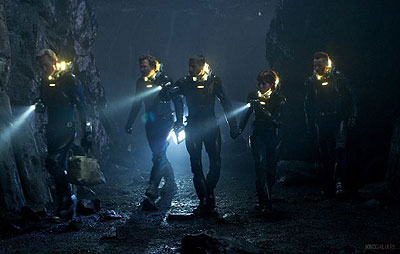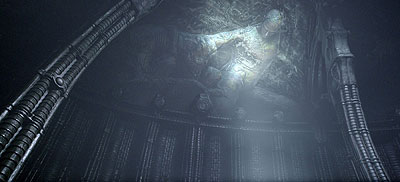Prometheus: More Than A Spectacle
Published on June 1st, 2012 in: Current Faves, Horror, Movie Reviews, Movies, Reviews, Science and Technology, Science Fiction |By Paul Casey

You will see Prometheus. Of course you will. If you have even a modicum of space knowledge of Ridley Scott, you will. Alien, Blade Runner, Prometheus. Even if this is a space version of Robin Hood, you have to see it. Ridley Scott is as important to science fiction cinema as Stanley Kubrick. We all know this. In spite of the cynicism and waiting Internet doom machine, you have no choice but to see this movie. And when you do, you need to see it in 3D.
Prometheus essentially ends the debate on whether 3D is gimmickry or something that has immense potential for cinema, in the hands of those who are able to use it. It results in a supremely beautiful, expansive science fiction movie, with a level of intensity that cannot quite be charted by regular film experience. As a prequel to Alien, Prometheus gives terrifying context to the events of that film, and plays things out on a grand scale. It does not interfere with its predecessor, but is created from its legacy. As the return of Ridley Scott to science fiction, it is an overwhelming melding of severe horror chops, and the philosophy of Blade Runner.
The heart of Prometheus, for all of its body horror, suspense, and Very Sick People, is not with Alien, but Blade Runner. This is, as Roger Ebert would say, a film with ideas. “What are we?” is the concern of all great science fiction. Here, a series of cave paintings gives directions to the location of a system where our creators, or “engineers,” may reside. These engineers recall in part the impenetrable wisdom, and cruelty of 2001 and 2010’s higher beings. Visually they are striking.
Like Blade Runner, the necessity of humanity to destroy other sentient life forms for our own survival brings a note of thoughtful melancholy. The inability of the audience to understand the exact motivations of the engineers pushes the audience into that hallowed space of sci-fi, where actions assumed righteous are mirrored as evil. As Edward James Olmos said to Harrison Ford: “You’ve done a man’s job, sir. But are you sure you are a man?”
While Scott’s use of replicants in both of his previous movies disallows some of the shock of the new, the story that winds around the desires of Michael Fassbender’s David is compelling. The larger story of the creators puts humanity in the place in which replicants reside in the Alien series as well as the work of Ridley Scott. Fassbender, in a brilliant, passively brutal performance, asks one of the scientists why he created him. Logan Marshall-Greene, a bit too fond of booze, responds, “Because we could.” Fassbender replies, “How would it make you feel, if that is what your creator said to you?”
Humanity is at the mercy of creators who do not care for their wants, or desires, and perhaps are unaware they have any. Humanity is given many faces. Naomi Rapace plays the searcher with steel backbone. Comparisons to Sigourney Weaver are obviously intended, and when a medical procedure is required, she grits her teeth and carries on.
Prometheus as viewed in its theatrical cut—I’m sure Ridley will pull out a couple in the next few years—is not as absolutely satisfying as straight horror as Alien. It is not as emotionally devastating and perplexing as Blade Runner. As a synthesis of the two, and in the use of some spectacular 3D, this is however, a Sci-Fi movie like no other. It gives brutality and hope. The ending reflects the bleakness of Ridley Scott’s future vision, and the hope to be found somewhere in there.
Prometheus is not stale work. It is vital, and needs to be seen on the biggest screen you can manage. To say it is merely spectacle, or stunning visuals covering up a lackluster story, is to fall into a predictable trap. The spectacle will get you to a deeper place. It always has with Ridley.

Time limit is exhausted. Please reload the CAPTCHA.